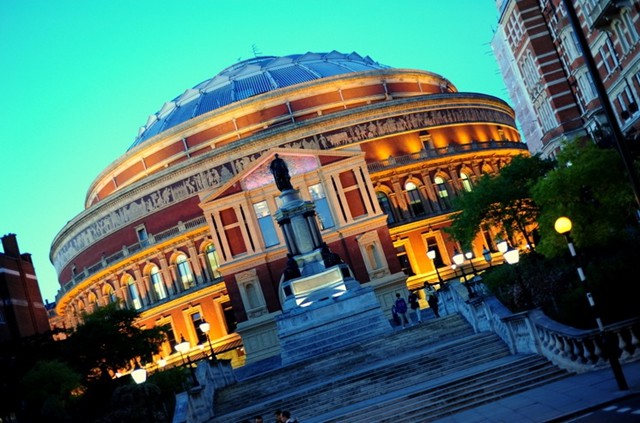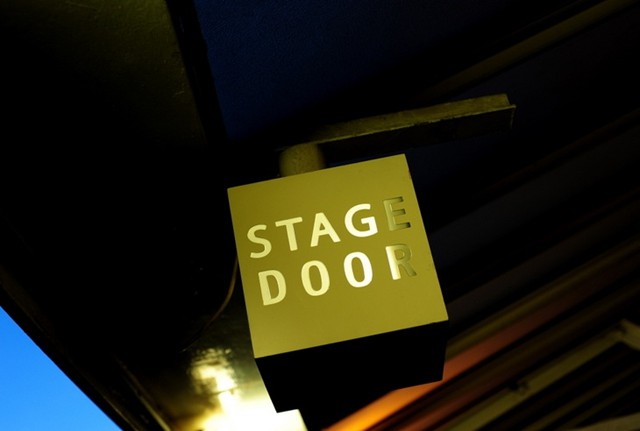
Few composers to emerge from the brass band world have gone on to find success in the field of classical music, but with an increasing catalogue of impressive works behind him, Gavin Higgins is a notable exception.
On the 13th September, his newly commissioned orchestral work ‘Velocity’ will be premiered by Sakari Oramo and the BBC Symphony Orchestra and will open the 'Last Night of the Proms' in what promises to be the biggest night of his burgeoning career.
4BR’s Chris Thomas caught up with Gavin to discuss what we can expect from the piece and how it feels to know that it will be broadcast to millions around the world.
Chris Thomas: When we last spoke it was in the wake of you receiving news of your Proms commission. Given the fairly short timescale available did the initial celebration ultimately give way to panic?
Gavin Higgins: The Last Night of the Proms is in fact the last concert of the season to be programmed and details were still being confirmed weeks after I had accepted the commission.
So I knew the time in which I had to complete the work was always going to be limited. This was not really an issue for me as I’m used to answering commissions with extremely tight deadlines, but it was clear that this commission would be the highlight of my career so far.
The fact that the concert is seen across the world certainly added some pressure, but I’ve tried not to think too much about that as I don’t believe invasive thoughts really add much to the creative process.
That said, I certainly understood how big a deal this was. In terms of profile and reach this is probably the biggest commission I’ve ever taken on.
Chris Thomas: How detailed was the brief you received from the BBC?
Gavin Higgins: Obviously the piece was commissioned to open the last night which is in many respects a party - the celebratory culmination of the UK’s most exciting and diverse classical music festival, so I suppose there was an expectation that my new piece would reflect this.
But really, all the BBC asked for was a ‘crash-bang-wallop’ fanfare that was around 4 minutes 30 in length; something to start the concert with suitable clout. The piece is not so much a ‘fanfare’ in the traditional sense but rather a concert overture.
I suppose Knussen’s ‘Flourish with Fireworks’ and Shostakovich’s ‘Festive Overture’ were both at the very back of my mind. That said, the work does open with three short brass fanfares but these soon give way to music that is more urgent and incessant.
The BBC was rather strict about the orchestration since space on stage is limited for that night, but beyond that, I was given free rein to write the piece I wanted to write.
Unlike the brass band world where music commissioned for contests can be extremely prescriptive, sometimes at the detriment of the music itself, the classical world is not so rigid.
They want a work by the person they have commissioned and so allow the composer to write the music they want.
Usually the only specifics are the length and orchestration. After that they trust the composer to create music that reflects their own thoughts and ideas.
It’s always better this way since your creativity is not restricted by strange requests and pressure to add particular things to the score.
Chris Thomas: You mentioned the title of ‘Velocity’ to me within days of receiving the commission. Did the title come to you immediately?
Gavin Higgins: No. I had to think hard about this. The ‘Proms Guide’ and website needed to be published within the week and so they needed a title almost straight away. This was a shame as I often come up with titles once I’ve actually started working on the music itself.
I knew I wanted to use just one word (too many of my titles are long and for this concert I felt the title needed to reflect the immediacy of the piece) and I knew it would be fast and lively.
I felt the piece was really all about momentum but Mark-Anthony Turnage had already taken that title for one of his orchestral works.
After a lot of debate my best friend suggested ‘Velocity’ and it seemed perfect.
Chris Thomas: So the initial goal was to create not just a concert ear opener, but a piece that defines energy and rhythmic propulsion in a very short time span?
Gavin Higgins: I guess so, yes.
The piece is really about forward momentum and energy and it really does whizz by. There is almost constant rhythmic activity in the piece with the only moment of respite being a few euphoric bars just before the work’s climax.
In terms of the Proms, the last night concert is the most viewed of the season. It’s not only streamed on radio but also broadcast live on TV across the world.
As far as I’m concerned the last night is a different beast to the Proms that precede it. It’s a party and, although people are there to hear music, they are also there to have fun.
This work needed to open the concert with a ‘bang’ and set the tone somewhat for the rest of the evening.
This was in fact rather challenging to get right. I hope the audience enjoys it.

Chris Thomas: Did you already have ideas banked for an orchestral work or did you start with a completely clean slate? If so, how did you find that the ideas formulated themselves?
Gavin Higgins: I was thrilled when Roger Wright called me and asked if I would write ‘Velocity’, but it meant putting the piece I was currently working on to one side.
I had to start almost instantly to meet the tight deadline. I knew it would be fast and driven and I also knew how the piece was going to end. That was all I really had in mind at the beginning.
I start all of my pieces in notebooks. I don’t actually write any musical notes down at all, except perhaps some rhythmic ideas. It usually begins with words or descriptions of what I want to do with the music.
For instance, ‘driving semis to brass climax’, ‘divisi strings over wind chords’, ‘euphoric’ ‘optimistic’ etc - or loosely mapped out structures and shapes of lines.
It’s all fairly vague at this point. The idea is to just get everything down on paper and decipher it later. I also take walks each morning because I find this helps to solidify my ideas.
But the bulk of my work is done sitting down at my desk where I work from about 10am - 9pm with a break for dinner. This whole process is long and drawn out and can take months for the ideas to fully form.
I often start pieces again a month or so into the writing and although this can be frustrating it’s usually a sign that I’m on the right path.
You have to work out what the piece ‘is not’ before you can commit to what the piece ‘is’.

Chris Thomas: Having had a sneak peak at the score, you’ve managed to cram a huge amount of incident into just a few minutes of music?
Gavin Higgins: Yes! I suppose there is a lot of music in the score. But when you strip it back you will see the whole piece is created from a simple six-note motif that is heard at the very opening in the brass fanfares.
This little melodic feature is heard almost incessantly throughout the work in different guises.
I’ve stolen somewhat from Debussy’s use of the famous flute theme in ‘L’après-Midi D’un Faune’.
This little theme appears again and again throughout the piece but by subtly changing the harmony, instrumentation and context Debussy reinvents it. Each time it appears he manages to infuse it with different meaning.
Although ‘Velocity’ is short I wanted it to feel substantial.
The structure of the piece is also simple; an Introduction and Allegro. Within the Allegro the music turns a number of corners but as with the melodic and harmonic material I’ve tried to get as much ‘juice’ out of simple ideas as I can.
The piece is colourful and driven, but whereas much of my other music explores darker themes - albeit with a sense fun - this piece is far more optimistic and uplifting.
Chris Thomas: And you have also succeeded in using the magnificent RAH organ?
Gavin Higgins: Yes - it really is magnificent! I was offered the use of the full symphony orchestra, choir and organ, but I felt using the choir would somewhat reduce the opportunity of further performances. I also felt the piece wouldn’t benefit from a choir.
I was in fact some way into writing the piece before I decided I would use the organ at all.
However, I think it’s a nice touch. It’s not absolutely necessary but it will certainly add an extra layer of depth to the work’s climax.
I thought a lot about the ending of ‘Taras Bulba’ and what an impressive effect it makes when the organ finally appears.
I was fortunate enough to work with the organist Malcolm Hicks who showed me around the Albert Hall organ and the kind of sounds it can make: It’s an incredible instrument.
The bass is like nothing I’ve ever heard and it can reach earth-shaking volumes - quite literally. You can actually feel your body vibrating!
Chris Thomas: How did you find the experience of having BBC TV cameras trailing you for your recent appearance on BBC2’s Proms Extra?
Gavin Higgins: Yes -it was rather fun, but very time consuming. They followed me for two whole days and tried to get a sense of my day-to-day life, which I’m afraid to say is rather dull.
I do what everyone else does: I get up, I go to work, and then I go bed. But I hope it comes across well on the TV.

Chris Thomas: I’m sure you are used to big premieres now but they don’t get much bigger than this! Are the nerves building yet?
Gavin Higgins: You’re right. It really doesn’t get much bigger than this. Millions of people across the world tune into this concert and it’s repeated throughout the year.
Of course I’m nervous - I think it would be strange if I weren’t.
But it’s excited nerves! I’ve worked with the BBC Symphony Orchestra before and they are a wonderful group of musicians who seem to understand my music.
The orchestra’s chief conductor Sakari Oramo is an incredible musician who seems to care deeply about the music he conducts. So I’m really looking forward to hearing them play my music again.
I’m never really good at first rehearsals so I’m a little apprehensive about hearing it all played for the first time. But by the time Sakari and the orchestra has pieced it all together I think it’s going to be an incredible experience.
Chris Thomas: Moving on from the Proms - You are about to start work on another exciting, major project that will see you writing for brass band once again?
Gavin Higgins: I have a very close relationship with Rambert Dance Company. In 2010 I became the company’s inaugural Music Fellow and since then have worked with them on a number of projects including ‘What Wild Ecstasy’, a work nominated for a British Composer Award last year.
They’ve performed my dance works all over the world and in theatres up and down the country including the Royal Opera House and consequently I feel completely at home working with them.
I’ve been commissioned to write a new ballet for the company that will premiere next year called ‘PRIDE’.
2014-2015 is the 30th anniversary of the miner’s strike, a topic close to my heart. To commemorate the miners struggle and celebrate the brass band legacy I am writing the first ever ballet to include a brass band.
It’s a very exciting and ambitious project and I’m having a lot of fun working on it. I always enjoy writing new works for brass band if I feel there is artistic worth in doing so. If it can help to further the cause and bring wider audiences to the banding world it makes my job feel relevant.
Of course bands themselves need to help prove the medium’s worth. I know how important brass bands are and truly believe that band music is relevant and utterly unique to Britain.
But to outsiders the impression is often one of insular music making and blinkered commissioning.
This idea, I’m afraid to say, is perpetuated by many individuals within the movement itself and I just wish they could the see the kind of long term damage these archaic attitudes will have on the movement.
If it is to survive and grow we have to embrace new ideas and new music. Normal concert going folk do not want to come and sit through repeat performances of the same work for five hours. They want to engage with the music, the heritage and the talent.

I totally understand that contests are the bread and butter of banding life but surely we want to bring new audiences to our concerts? I used to encourage other composers to try and write for brass band but I’ve all but given up now since these pieces are so unlikely to be programmed and performed.
If they are, then I fear reactions would be similar to those given to works such as ‘Prague’, ‘Sounds’ and ‘Grimethorpe Aria’ and this would put them off for life.
I’ve attended a lot of Proms this year and, as usual, I am heartened to see a real cross section of society enjoying the concerts. Adults and children from every walk of life visit the hall over the Proms period and most concerts are sold out.
And the pieces that get people most excited are the new ‘challenging’ commissions.
Simon Holt’s Flute Concerto, ‘Morpheus Wakes’ brought the house down. There was unprecedented excitement surrounding the late night prom with Benedict Mason’s ‘Meld’.
The large number of Birtwistle works in this, his birthday year, have been received warmly. I could go on.
The idea that audiences in the banding world aren’t ready for this kind of music is nonsense and the longer it’s perpetuated the more damaging it will be.
When there is a feeling amongst players and conductors that anything new and challenging is ‘modern rubbish’ then what hope is there for our audiences?
As is proven year after year in the Proms, audiences enthusiastically relish new music. No one leaves the hall complaining, in fact quite the opposite.
They sit or stand for hours at a time, listening and engaging and come out having experienced something different and exciting. Some people don’t necessarily ‘get it’ (whatever that means), some people might not even like the piece, but they still enjoy hearing new orchestral colours and take what they will away from the experience.
I’ve often been asked, with a pained expression, ‘your new piece isn’t too modern is it?’
Well, of course it’s modern. I’ve just written it! What they are actually asking is, ‘is it harmonically and rhythmically complex? Because I’d rather not be challenged and taken outside of my comfort zone’.
This says much more about their own musical insecurities and laziness than what they perceive audience’s feelings are towards new music. It’s a selfish point of view to take. When I am faced with these kinds of questions my heart sinks. It upsets me to think that our unique banding world is too often in the hands of those whose minds are closed.
Those stubborn few in the banding world who hold these out-dated opinions must, for want of a better phrase, ‘get with the program,’ because times are changing and they will be left behind.
In a world in which the way we appreciate and listen to music has changed dramatically, many orchestras and ensembles are now realising that in order to validate their continued existence, the model that’s worked for hundreds of years has to be reviewed.

We in the banding world therefore have to work even harder to secure our place in the wider musical community since we are already someway behind in the game.
I was thrilled to see that the Arts Council recently increased funding substantially to Brass Bands England and rightly so. I hope they do something good with the money.
But this means the banding community now has to work especially hard to prove its relevance. If you want to see bands on the TV again you have to prove why this music is important.
If you want to see bands at the Proms you need to approach them with an exciting and innovative concert proposal.
For too long banding has remained insular and closed and if attitudes do not change I fear that there will not be a place for this music outside of the small banding communities that already exist.
Surely we can all agree that playing to what are essentially our friends and families, is not a sustainable and viable model for innovation and excellence.
Shockingly few bandsmen and women seem to support each other at contests and concerts. This I have never fathomed. If we can’t show support for our colleagues then we can’t expect support, financial or otherwise, from outside of the movement.
I hope my new work with Rambert will not only appeal to brass band audiences but will also reach people from outside of the movement who have never heard a brass band before.
The only thing we have left from our mining heritage is the plethora of incredible brass bands that are littered over the country and this is something to be extremely proud of.
Rambert regularly perform to sell out audiences when they tour so this new work will be seen by thousands of people across the country. It’s a really great way to showcase our bands and what the players can do.
Who knows, perhaps a new legion of brass band fans will be born and that would be very exciting.
Chris Thomas: Thanks for chatting to us Gavin and best of luck for the premiere.













